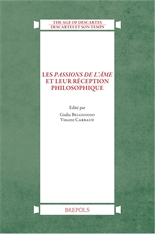
Les Passions de l’âme is Descartes’s last published work. When it appeared in 1649, both in Amsterdam and in Paris, the philosopher was already in Stockholm, invited by Christine of Sweden. Yet, it is for sure the discussion with Elisabeth, a few years earlier, what provided the occasion for its writing, even if Descartes probably considered that this work was required to complete the study plan planned for the Principia philosophiae. “My aim”, said Descartes, presenting it, “was not to explain the passions as an orator, or even as a moral philosopher, but only as a physicist”. By announcing on April 15, 1649 to Henry More the imminent publication of a short treatise on affections, he already specified that he would show “how all the movements of the body which accompany our passions are produced in ourselves not by the soul, but by the sole mechanism of the body ”.
However, Descartes did not content himself with speaking of the passions as a physicist. He made other major philosophical decisions which set him apart from all the moralists of the Grand Siècle: to endow mechanistic physics with a theory of passivity; to make admiration the first of the primitive passions; propose a new definition of love; substitute the principle of self-esteem for the traditional condemnations of self-love; give liberty the figure of generosity, etc. The Passions of the Soul are therefore, in more than one way, a singular work.
By bringing together the papers delivered during the double colloquium held in Paris and Lecce in 2014, this volume closes a rich set of studies initiated in 1987 on the occasion of the 350th anniversary of the Discourse on Method, systematically devoted to works published by Descartes himself. The articles that make up these acts add to the meticulous analysis of the Passions of the soul the examination of their contemporary context and grant the reception of the treatise, from Malebranche to Husserl. There will follow a renewed understanding of the work which delivers the last fruits of Cartesian philosophy. However, it does not dispel the enigma: for it is that of its object, “the nature of man.”
Contents
Ire : Le texte et ses concepts
I. Antécédents, textes et contextes
- Classifying the Passions : Descartes and his Scholastic Background (Dominique Perler)
- Verso una ridefinizione del lessico scolastico-cartesiano delle passioni (Igor Agostini)
- De toute la nature de l’homme: De l’Homme à la Description du corps humain, la physiologie des Passions de l’âme et ses antécédents médicaux (Annie Bitbol-Hespériès)
- Les Passions de l’âme, un testo stratificato: l’influenza di Elisabetta (Franco A. Meschini)
- La désaffection du monde : les quatre thèses fondamentales de la correspondance avec Elisabeth (Alexandre Guimarães Tadeu de Soares)
- The Correspondence between Princess Elizabeth and Descartes Revisited: The Countess of Horne and the Epistolae Edition (Erik-Jan Bos)
- Passiones sive affectus animae : Le thème latin d’un étudiant (Corinna Vermeulen)
- Les passions du philosophe et le progrès de la science : la Préface des Passions de l’âme (Mariafranca Spallanzani)
II. Des passions en général
- Parler des passions « en physicien » ? (Gilles Olivo)
- La connaissance à l’estime (Jean-Luc Marion)
- Sur le sujet des émotions intérieures : Descartes et François de Sales (Denis Kambouchner)
- Le Passions de l’âme e il fenomeno del mondo : uno schizzo (Vincent Carraud)
- L’interaction entre l’âme et le corps (Hiroaki Yamada)
- Cinéma 1, ou le discours indirect libre de Descartes en Deleuze (Xavier Kieft)
- La volonté du mal et la haine dans la Lettre à Voet, un impensé des Passions de l’âme ? (Pablo Pavesi)
IInde partie : Réceptions
I. La réception des Passions de l’âme dans l’Europe savante
- Une réaction peu connue aux Passions de l’âme : Regius et Descartes (Theo Verbeek)
- Clauberg et la générosité de Descartes (Domenico Collacciani)
- Générosité et habitude dans le cartésianisme (Giuliano Gasparri)
- Passions of the Soul in Descartes and the First Cartesians (Roger Ariew)
- Descartes diverti : Pascal lecteur des Lettres à Elisabeth et des Passions de l’âme (Laure Verhaeghe)
- Descartes, Pascal et la gloire (Alberto Frigo)
- Spinoza lecteur des Passions de l’âme (Laurence Renault)
- Spinoza selon l’ordre des affects (Frédéric Manzini)
- Passive and Active Love in Descartes and Malebranche (Tad M. Schmaltz)
- Malebranche et le concept cartésien de l’amour de Dieu (Gábor Boros)
- La théorie des passions de Régis (Antonella Del Prete)
- Le Passioni dell’anima nello studio romano : il corso di filosofia naturale di Vitale Giordani (1689-1690) (Alessandra Fusciardi)
- Signes extérieurs des passions et caractéristique anthropologique : de Descartes à Kant (Francesco Tommasi)
II. Lectures phénoménologiques
- Passivité et causalité psychophysique : Husserl cartésien ou spinoziste ? (Dominique Pradelle)
- Au-delà de Merleau-Ponty : l’ultime avancée phénoménologique de Descartes (Wojciech Starzyński)
- L’âme cartésienne est-elle passive en ses passions ? De la double insuffisance du traité des Passions de l’âme selon Levinas (Dan Arbib)
- La passivité ontologique originaire henryenne à l’épreuve des Passions de l’âme (Grégori Jean)
Annexe: L’œil de Descartes (Yves Pouliquen)
Index nominum
Index des articles des Passions de l’âme